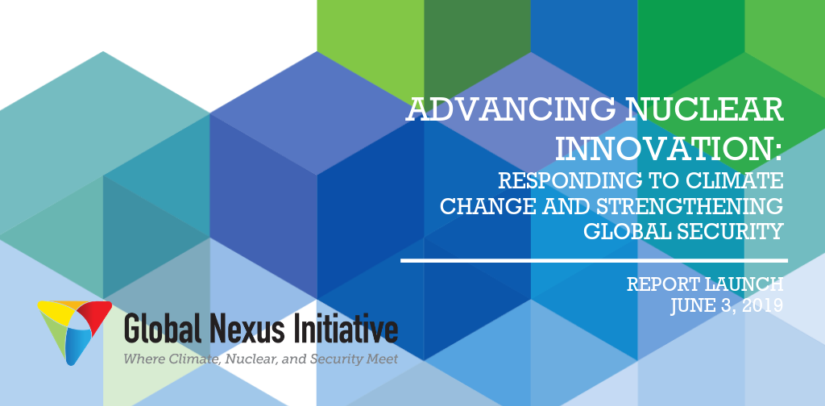Advanced Nuclear Reactors Can be Safeguarded, Representing Progress Toward Commercialization
Report by international panel of experts is first in-depth review of advanced reactor technologies and their role in climate change and global security
Washington DC, June 3, 2019 – A groundbreaking report released today sees a key role for advanced nuclear reactors in meeting the world’s need for clean energy and concludes that any of the three leading reactor technologies can be safeguarded to prevent nuclear weapons proliferation.
The report by the Global Nexus Initiative (GNI) is the first in-depth publicly available assessment of the non-proliferation, security, and geopolitical characteristics of the three main advanced nuclear reactor technology types – molten salt fueled reactors, TRISO-fueled reactors and fast neutron spectrum reactors.
The GNI report concluded that all three types can be safeguarded by the International Atomic Energy Agency (IAEA) to prevent nuclear weapons proliferation. Each type has different challenges and none can be safeguarded in exactly the same way as the hundreds of Light Water Reactors (LWRs) currently operating around the globe, and the report recommends that both the IAEA and the reactor designers take steps in the design phase to facilitate effective international safeguards. Safeguards refer to the procedures designed to allow the IAEA to determine that nuclear facilities and materials are not being diverted for nuclear weapons purposes.
“Advanced nuclear technology has great potential to help address the world’s need for clean energy, and there is broad agreement that it should be safe and not contribute to the spread of nuclear weapons,” said Kenneth Luongo, President of the Partnership for Global Security, a co-sponsor of GNI. “Our report is the first published analysis that has looked closely at the characteristics of advanced reactor types to understand how the main designs fit within existing safeguards and security frameworks.”
“This report marks an important step forward for the development of advanced nuclear technology. The next generation of nuclear reactors are critical for progress in lowering carbon emissions and ultimately helping reach our climate goals. We encourage continued engagements between the reactor designers and the IAEA to ensure cost-effective safeguards, and the report will be a useful framework for this dialogue,” said Maria Korsnick, President and CEO of the Nuclear Energy Institute, a co-sponsor of GNI.
“Nearly every study suggests nuclear energy could be an important – perhaps essential — option to help address climate change, but cost, deployability and public perception challenges remain that advanced reactors could address,” said Armond Cohen, executive director of the Clean Air Task Force and a member of the GNI Working Group.
Advanced reactors likely will be ready for deployment within one to two decades, setting the stage for major technological competition among powerful geopolitical rivals, the GNI report added. Russia and China have shown an advantage in advanced reactor development, have state financial backing, and have tied their nuclear-export strategy to their geopolitical ambitions. The international community must ensure that any race for market share among geopolitical competitors strengthens nuclear governance rather than weakens it, the report concluded.
The report is available here (Link)
About the Global Nexus Initiative
Since its formation in 2015, GNI has focused on the intersection of nuclear power, climate and security issues. It is the first group to bring together leading experts from the nuclear industry, nuclear security, diplomatic and environmental communities to examine these complex challenges. The GNI is co-sponsored by the Partnership for Global Security and the Nuclear Energy Institute. Its work was made possible by the financial support of the John D. Catherine T. MacArthur Foundation.
This report was developed by a diverse Working Group of 16 international experts who worked over the past year and consulted with a wide range of audiences, including reactor developers, policymakers, academics and international security officials and institutions.
Media Contacts:
Partnership for Global Security
Kenneth Luongo, kluongo@partnershipforglobalsecurity.org
Richard Mahony, richard@mahonypartners.com
Nuclear Energy Institute
Mary Love, media@nei.org
Everett Redmond, elr@nei.org
Mary Pietrzyk, mmp@nei.org
Download Print Version

